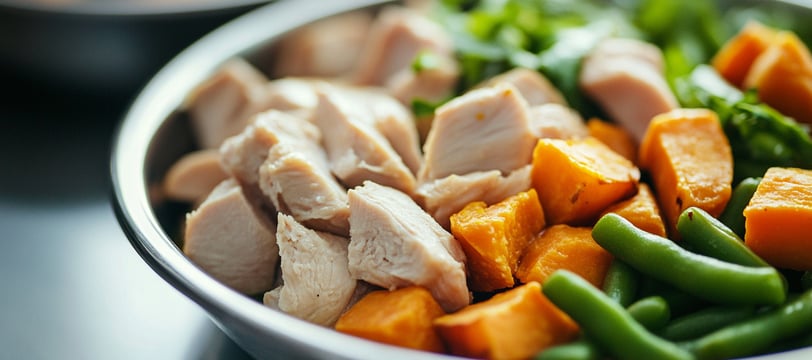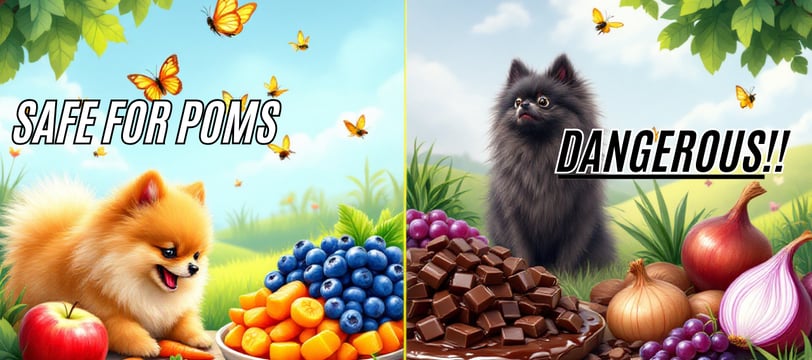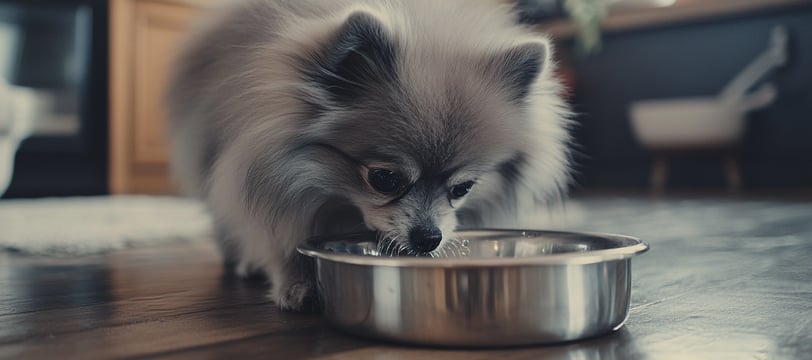Essential Nutrition Tips for Pomeranians
Discover essential nutrition tips for Pomeranians! Learn what to feed your Pomeranian, including the best proteins and healthy fats, as well as foods to avoid to keep your furry friend in top shape.
POMERANIANS
Pawsitively Pomeranians
11/17/20243 min read


1. Understanding Your Pomeranian’s Nutritional Needs
Pomeranians are small dogs, but don’t let their size fool you—they have specific dietary needs. Due to their high metabolism, they require a diet rich in quality proteins, healthy fats, and the right balance of carbohydrates. Let’s dive into the key components of a well-rounded Pomeranian diet:
A. High-Quality Protein
Proteins are the building blocks of your Pomeranian’s muscles and are crucial for energy. Good sources of protein include:
- Lean Meats: Chicken, turkey, beef, and lamb are excellent options.
- Fish: Salmon and whitefish are rich in Omega-3 fatty acids, which support a healthy coat.
- Eggs: A fantastic source of protein and nutrients.
Tip: Always cook the meat to avoid harmful bacteria. Raw diets should be discussed with your vet before implementation.
B. Healthy Fats
Fats provide energy and promote a healthy coat and skin. Look for:
- Fish Oil: Rich in Omega-3 and Omega-6 fatty acids, great for joint health and fur shine.
- Chicken Fat: A tasty source of energy that is easily digestible.
- Coconut Oil: In moderation, it can aid digestion and improve coat condition.
C. Carbohydrates and Fiber
While protein and fat are crucial, healthy carbohydrates provide energy and promote good digestive health. Consider:
- Sweet Potatoes and Brown Rice: Easily digestible and packed with nutrients.
- Pumpkin: Great for digestion and can help prevent constipation.
Note: Avoid overloading your Pom’s diet with grains; they should always be the lesser part of their meal.
2. Fruits and Vegetables: The Good and the Bad
Pomeranians can benefit from fruits and veggies, but it’s essential to know which are safe and which are harmful.
A. Safe Options
- Carrots: Low in calories and great for dental health.
- Blueberries: Full of antioxidants to support the immune system.
- Apples: A few slices without the seeds can make for a sweet, crunchy treat.
- Green Beans: Low in calories and high in fiber.
Pro Tip: Always wash fruits and veggies thoroughly and cut them into bite-sized pieces.
B. Foods to Avoid
- Grapes and Raisins: Highly toxic to dogs and can cause kidney failure.
- Onions and Garlic: These can damage your dog’s red blood cells and lead to anemia.
- Avocado: Contains persin, which is toxic to dogs.
- Cherries: The pits contain cyanide, which is dangerous if consumed.
3. Hydration: The Key to a Healthy Pom
Water is vital for your Pomeranian’s overall health. Make sure your dog has access to clean, fresh water at all times. Dehydration can lead to serious health problems, especially in such small breeds.
4. Foods to Avoid Altogether
Some foods are not just unhealthy but downright dangerous for your Pomeranian. Here’s a quick list:
- Chocolate: Contains theobromine, which is toxic to dogs.
- Caffeine: Found in coffee and tea, it can cause restlessness and heart issues.
- Alcohol: Even a tiny amount can be harmful.
- Xylitol: A common artificial sweetener found in sugar-free products, extremely toxic to dogs.
5. Supplements: Are They Necessary?
In most cases, a balanced diet will provide all the nutrients your Pomeranian needs. However, certain situations may call for supplements:
- Joint Support: Glucosamine can be helpful, especially as your Pomeranian ages.
- Probiotics: Products like Pawbiotix can support gut health and boost immunity. Consult with your vet to ensure it’s right for your pup.
6. Feeding Schedule and Portion Control
Because of their small size, Pomeranians do best with multiple small meals a day. Feeding them twice or three times daily helps maintain their energy levels and prevents hypoglycemia, a common issue in small breeds.
Portion Control
Overfeeding can lead to obesity, which puts stress on their tiny joints and can cause other health problems. Use a measuring cup to portion out food accurately and keep track of treats given throughout the day.
7. Final Tips for a Happy, Healthy Pom
- Introduce New Foods Slowly: Sudden changes can upset their stomach.
- Watch for Allergies: Symptoms like itching, vomiting, or diarrhea may indicate a food allergy.
- Treats in Moderation: Opt for healthy, dog-friendly treats, and avoid overindulging.
In Conclusion: Feeding your Pomeranian a nutritious, well-balanced diet is one of the best ways to ensure they live a happy and healthy life. Remember to consult with your veterinarian if you’re ever unsure about specific foods or dietary changes.
What’s your Pomeranian’s favorite treat or meal? Share it in the comments below—we’d love to hear all about your fluffy friend’s dining preferences!




